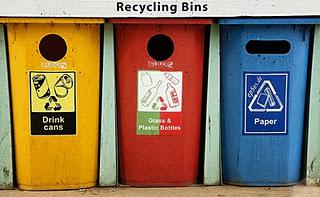 My dad has always been an advocate for reusing, reducing and recycling.
My dad has always been an advocate for reusing, reducing and recycling. He crushes cans and cartons before throwing them away, pops the bubble wrap, and breaks down cardboard boxes.
The man uses the backs of old receipts, old envelopes, and other scraps of paper to write notes and reminders on before recycling them.
He reuses boxes and plastic bags and even recently started a compost pile in the back yard.
It's no surprise that I, his progeny, am also recycle-obsessed.
I reuse old clothes as fabric for crafting projects and hold onto the rest for use as costumes for my musical theater company. Like my father, I write all over scraps of paper before recycling them and break things down before throwing them away.
My husband and I recycle plastic, batteries, glass, paper, and compost. We borrow, acquire and buy used.
So, you can only imagine how thrilled I was when I realized that I could also recycle my writing.
How does that work? you ask.
When you write an article, you spend time interviewing and researching on a specific topic and then turn it into a piece to be used for a particular publication.
Instead of starting from scratch for the next writing assignment, take what you have and re-structure it to fit the needs of another publication.
For instance, I recently wrote an article on the use of the English language in the business world here in the Netherlands for an expat newspeper. I interviewed language specialists, language purists, and business people. The article earned me €50.
But I still had interview snippets and information that didn't fit into the 700-word article. So, I rewrote the piece including new information and presenting the old information in a new way with new wording and sold it to an expat magazine for €160.
It took me perhaps 30 minutes to restructure, proofread, and edit that second article.
Instead of earning just €50 with the piece, I earned €210. Much better.
There are also a lot of pieces I wrote for non-paying sites and publications. Rather than letting them languish, making nothing, I can go back and re-write them for possible sale to other publications.
The same goes for my old blog posts. And any other article I've written in the past, am working on now, or may be writing in the future.
At the moment, I'm trying to resell an article on a fascinating topic that recently fell on my lap. A WWII bomber pilot shot down over Nazi occupied Holland was just reunited with the Jewish girl who lived with him in hiding 67 years later. All because the pilot's son decided to record his father's story in novel form.
I conducted the interviews, read the book, and did some research. The story has already been written up and published in one publication, but why leave it at that? I've done the work and the story deserves to be told in as many ways and for as many audiences as possible.
So, now the trick is to find other publications that might be interested and pitching the piece to them. Then I take a little time to tweak the information to make the story more specific to each publication and its audience and, voila, the article earns me more!
You take something old, re-work it and make it into something new that can be used again.
Yes, no matter how you look at it, recycling rocks.
Do you recycle your written work? How do you feel about recycling?
Image: epSos.de, Flickr
© 2011 Tiffany Jansen, writer

